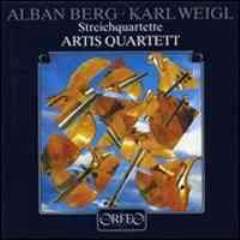Alban Berg & Karl Weigl - String Quartets (1990)
Alban Berg & Karl Weigl - String Quartets (1990)

Karl Weigl: Streichquartett No. 3 A-Dur op. 4 01. Innig bewegt [0:08:51.33] 02. Kräftig bewegt [0:04:34.10] 03. Sehr langsam [0:10:54.10] 04. Stürmisch [0:08:01.07] Alban Berg: Streichquartett op. 3 05. Langsam [0:09:19.33] 06. Mäßige Viertel [0:10:45.37] Alban Berg: Lyrische Suite für Streichquartett 07. Allegretto gioviale [0:02:56.73] 08. Andante amoroso [0:05:54.00] 09. Allegro misterioso - Trio estatico [0:03:18.52] 10. Adagio appassionato [0:05:01.70] 11. Presto delirando [0:04:22.28] 12. Largo desolato [0:05:08.65] Artis Quartett: Peter Schuhmayer – 1. Violin Johannes Meissl – 2. Violin Herbert Kefer– Viola Othmar Mueller – Cello
Alban Berg's String Quartet, Op. 3 (1910) was the last work the composer produced under the tutelage of Arnold Schoenberg. First perfomed in 1911 and published nine years later, the two-movement String Quartet was not well received at its premiere and received no further performances for more than a decade. Schoenberg, however, admired the piece, and the work may rightly be regarded as an appropriate valedictory for Berg's transition from apprenticeship to musical maturity. According to Berg's wife Helene, the inspiration for the Quartet was born of the frustration both she and Berg experienced when Helene's father forbade the two lovers from seeing one another. In this work, Berg takes a great step beyond the compositional idiom of his Piano Sonata, Op. 1 (1907 - 08) and the Four Songs, Op. 2 (1909 - 10). The Quartet's thematic craftsmanship bears a relationship to that of the earlier Piano Sonata, but the Quartet is far more complex. Whereas tonality had restricted Berg's language in the earlier work, the free atonal idiom of the Quartet allowed the composer to develop his material with unprecedented freedom and variety. In the first movement Berg establishes a web of motivic relationships within a sonata-form outline. The opening theme bears a striking resemblance to a theme from Schoenberg's Verklärte Nacht (1899) and is built on a slightly modified whole-tone scale that would reappear in the opera Wozzeck (1917- 22). A transformation of this theme becomes a fundamental figure in the second movement, which again contains material similar to that in the work of another composer: the love duet from Richard Wagner's Tristan und Isolde (1857 - 59). Scholars disagree on the formal design of this movement but tend to describe it as a type of rondo or sonata-rondo. Berg's use of motives and passages derived from cycles of intervals, his attention to detail and every detail's relationship to the whole, and his expert, idiomatic writing for the string quartet all point to the work of a composer assured in technique and possessed of a distinctive musical personality. --- classicalarchives.com
Lyric Suite composed in 1925-26, this work for string quartet is often said to be Berg's most beautiful work. It is his first large-scale work to employ the twelve-tone method of composition. Berg's love for Hanna Fuchs-Robettin was the inspiration for the Lyric Suite. The titles of the movements, containing the words gioviale (jovial), amoroso (amorous), estatico (ectatic, ecstacy), and so on hint strongly that the work is in some way about emotion. The construction of the work is quite complex, with elaborate row organization and extensive cross-referencing between the movements. The tempi of the movements alternate between increasing extremes of fast and slow. Shown below are the changes in speed. The left-hand movements increase in speed while the right hand ones decrease. (I) Allegretto gioviale (II) Andante amoroso (III) Allegro misterioso (IV) Adagio appasionato (V) Presto delirando (VI) Largo desolato ---d1f.com
In 1910, the String Quartet No.3 in A Major, Op.4 by Karl Weigl won the prestigious Beethoven Prize. This was no accident. His music was championed by the likes of Gustav Mahler, Richard Strauss, Bruno Walter and many others. Weigl, up until the Second World War, was recognized as one of the most important living composers. We believe this is one of the most significant and important string quartets of the 20th century. --- editionsilvertrust.com
download: uploaded anonfiles mega 4shared mixturecloud yandex mediafire ziddu ifolder
Last Updated (Saturday, 24 August 2013 09:15)








